Unlocking A Bestseller: Million Dollar Weekend by Noah Kagan
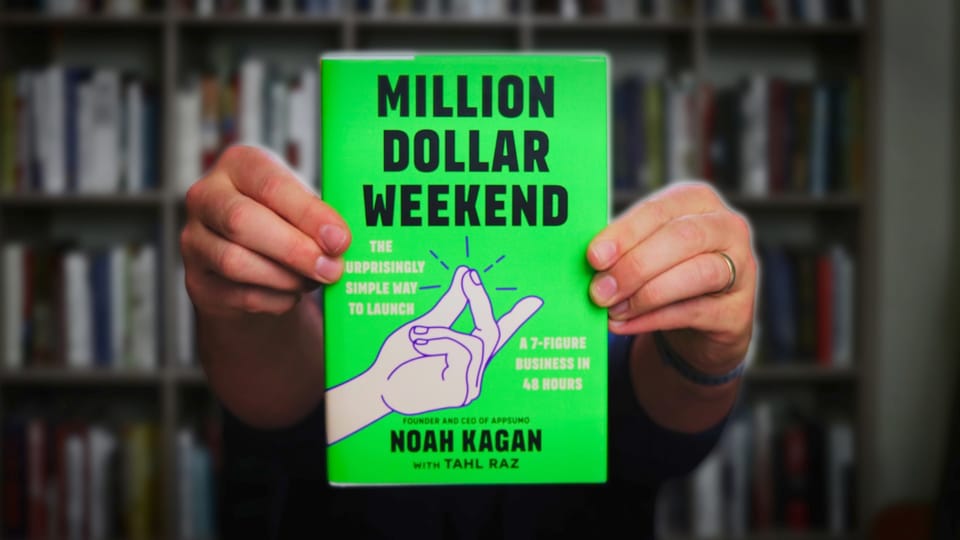
Last week, Million Dollar Weekend by Noah Kagan hit the New York Times Bestseller List (#8) and Amazon's Most Sold Books List (#8 again).
This success was 13 years in the making, and I was there to personally witness Noah go from "entrepreneur with a big idea" to New York Times best-selling author.
In this post, I'm going to show you what it takes to go on this type of journey, so you can take your ideas and turn them into bestsellers.
If you prefer to watch the video instead, check it out here.
And be sure to subscribe to my new YouTube channel, where I'll be posting more "Bestseller Breakdowns."
I first met Noah Kagan back in 2009, where I directed Ramit Sethi to throw a cup of coffee into his face. The bit was for a comedy sketch we wrote called 'Extreme Frugality.'
Noah took the coffee to the face like a champion, and thus began our friendship.
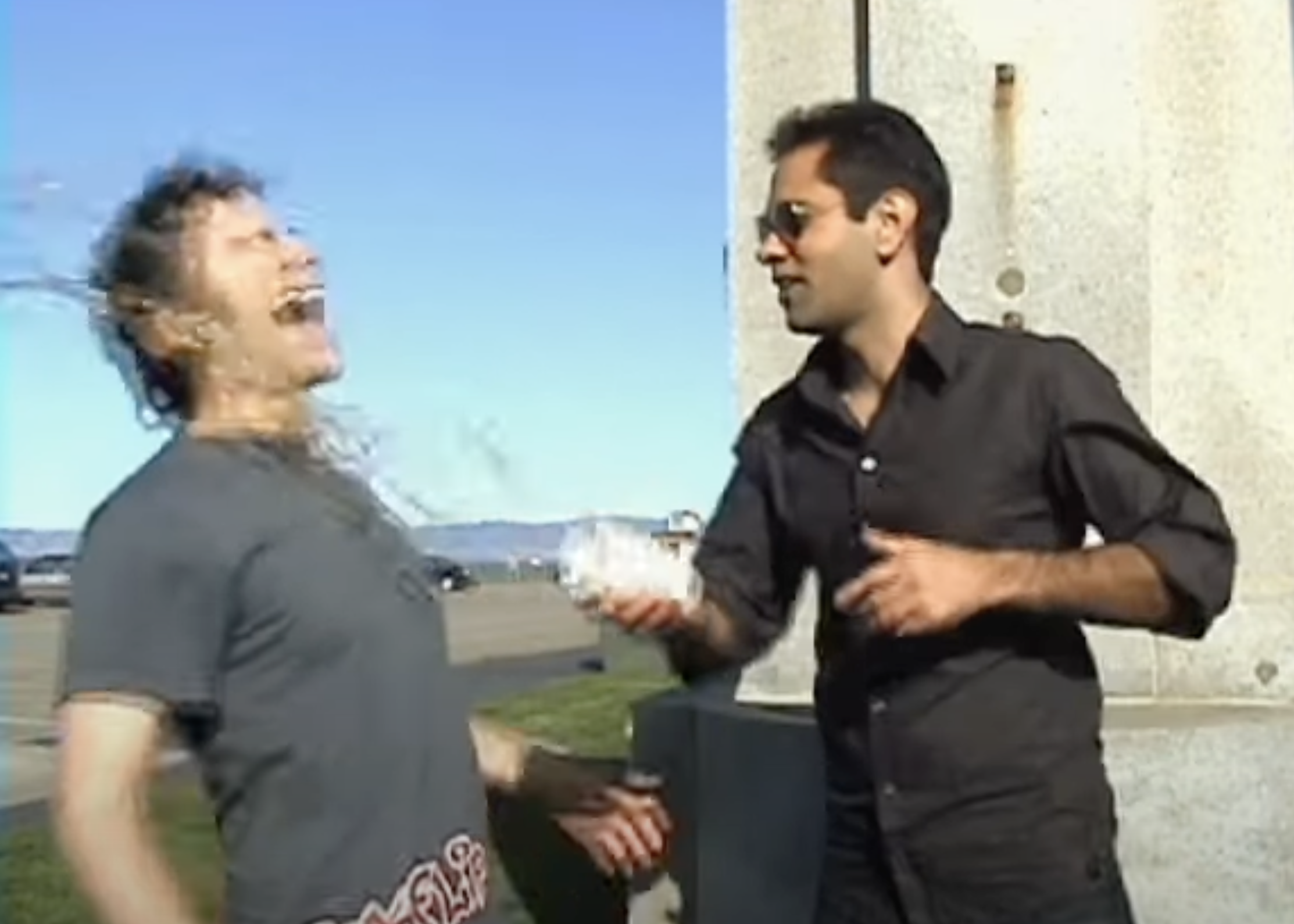
For the last 15 years, we've bounced good (and bad) business ideas off of each other. I introduced him to Ayman Al-Abdullah, who became the CEO of his company, AppSumo ($80M+ company).
One of the main ways that we've collaborated together is through Noah's writing. This brings us to the first step in creating a bestselling book, which is...
Step 1. Validate The Concept
When I was working with Tim Ferriss, Noah suggested that he do a guest post about how to start a million-dollar business in 48 hours.
Respectfully to Noah, when he emailed me this draft, it was a mess. It was a bunch of thoughts cobbled together, random dry humor sprinkled throughout, and there wasn't quite enough meat there.
This is normal for a first draft. It's not a knock on Noah, at all. We could see that there was something really brilliant there, especially with Noah's background starting six (6) million dollar companies. We knew there was something special about the concept.
It took me a long time to edit the post, but when it finally went live on Tim's blog, readers LOVED it. To this day, it's still one of the most popular posts on Tim's blog.
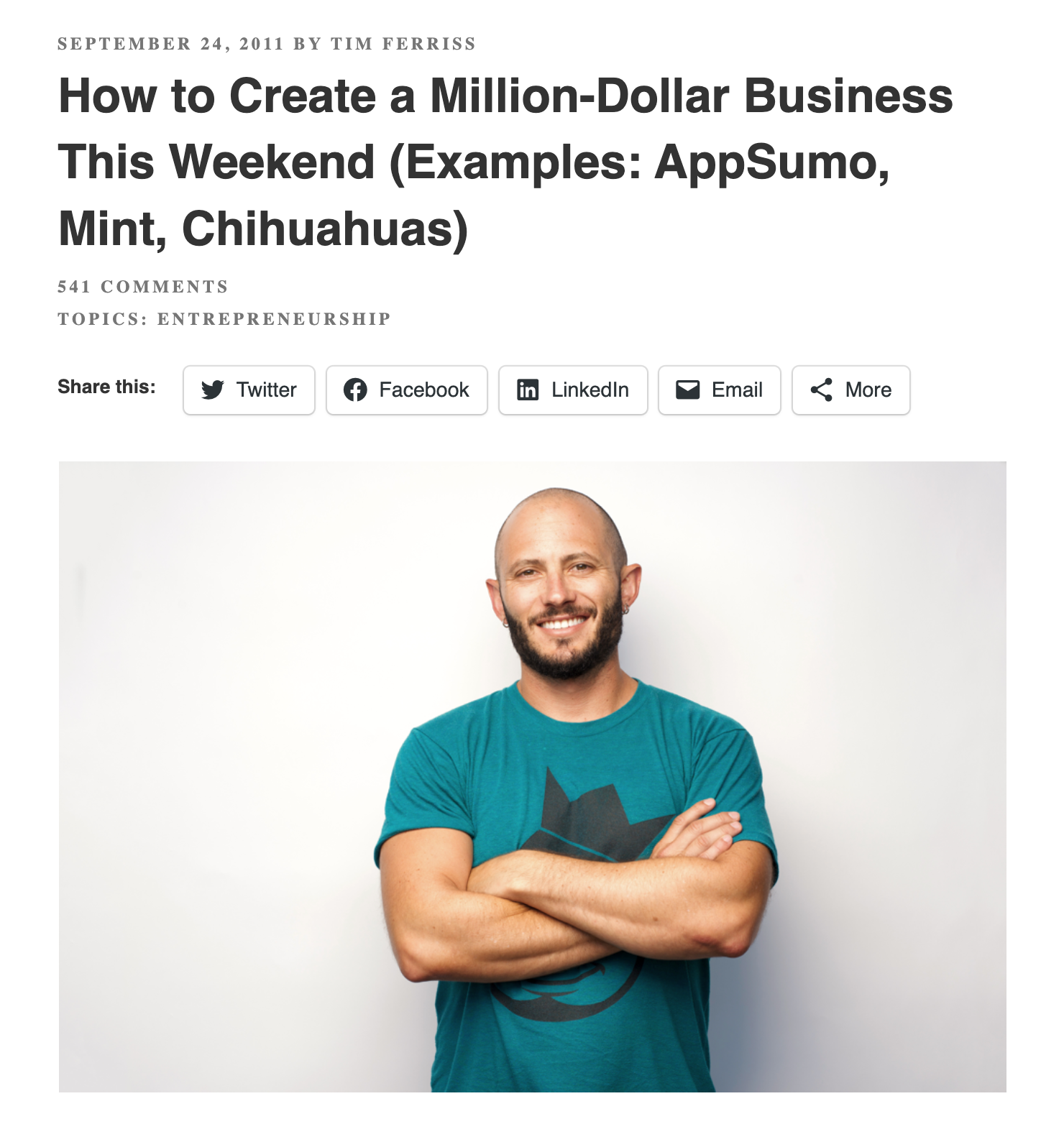
That popularity validated the concept that this could be a book.
You can validate your ideas for free just by writing a great article or a great tweet thread. If you look at The Almanack of Naval Ravikant, it sold over a million copies.
How did that book get its start? With a tweet thread!
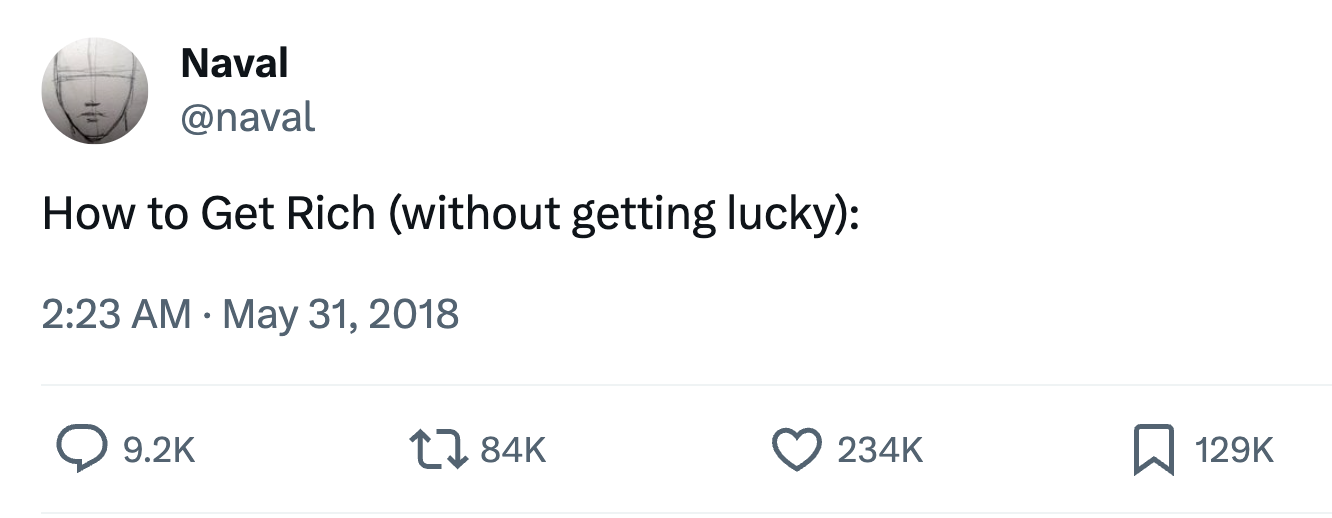
If you're posting the premise to your book online, and people aren't sharing, commenting, or being transformed by it... it's not good enough.
Step 2. Have a Platform
Noah is an email marketing genius. AppSumo has over 1 million subscribers on their email list. He's emailed people for over a decade who are his fans, who are his customers. They're going to want to buy the book.
Email is the single most effective online platform for selling products, especially books. It outperforms social media platforms by 50 to 100x.
That's right. For every 100 books you'll sell on email, you'll sell maybe 1 or 2 on a platform like YouTube or Facebook.
I use SendFox, which is an email tool that Noah developed, and I've used it for years. SendFox is a one-time purchase, not a monthly fee, and if you have 10,000 subscribers, it costs $100 for life.
Step 3. Coach Through Fears
I have never met an author who didn't have some fears during the process of writing a book, whether it was at the beginning or at the finish line. Writing a book and putting it out there is a big, big act, and it brings up a lot of insecurities.
You can read the transcript of Noah and I talking through this on his podcast in this segment right here:
Noah: I think putting myself out there really publicly is a fear and challenge of, 'Is my message worthy? Can I help the people that I think I can help? Do they even need my help? Do I even want to be that big?' Part of me is like, 'I am afraid. I don't know what's behind that door.' And so that gives me a little bit of motivation to face it. I don't know if I'm being like a whiny bitch and...
Charlie: Stop. I've talked to hundreds and hundreds of authors over the last 10 years. Literally, all of them have the exact same underlying emotion, which is fear. Because fear, or I'm sorry, change to your mind is death. And so that radical of a change means the death of your current level of your current life.
Noah: Yes.
Charlie: And so your brain interprets it as death, and that is scary. It's death to your current self. You have to grieve your past life.
Noah: Some next-level shit, Charlie. Where is this coming out of?
Charlie: Just the truth.
Noah: I'm so afraid, Charlie! (laughs)
Charlie: Well, let's talk about them. What did you say is the number one fear around the book?
Noah: Do I really want this now? Is this worthy of my time? I really admire like the Jeff Bezos and Zuckerberg and these people making things. I want to follow the path of, you know, maybe the Branson or the Bezos or the people who've made the businesses. They're not making books.
Charlie: Branson has written a few books. You can also follow the path of Noah Kagan, and a book might be really great right now.
Noah: I guess I just like, 'Is that what I want to do? Do I need everybody else to make feel good about myself?'
Charlie: I'll tell you, you won't feel good about yourself by helping everybody else, clearly. Because you've been doing it for years and you're still dealing with this.
Noah: That was some shit right there.
Charlie: That's got to come from you.
Noah: I feel ready. I feel more ready to go into the fire.
So if you're writing a book and you have some fears, worries, doubts around it, get a coach. I don't care if it's somebody like myself, which you can sign up for here, or somebody who's just a mindset coach.
You need to get through those fears so that you can publish your book and make an impact on the people whose lives you want to change.
Step 4. Hire Help
One of the biggest myths is that the author did the book alone. It's never true. Look in the Acknowledgements section, and you will see all the people who helped them:
- Their agent
- Their publishing house
- Their cover designer
- Their interior designer
- Friends
- Family
- Support that they had during the process of publishing the book
It takes a village to make a book!
In this instance, Noah made the brilliant decision to hire Tahl Raz, one of the best writers on the planet. Tahl helped Keith Ferrazi write Never Eat Alone, and Chris Voss write Never Split the Difference. Two mega-bestsellers.
Then Noah hired me to help with editing.
I loved working with Tahl because he is a phenomenal writer. It really illustrated such an important concept, which I'll steal from my friend Tucker Max:
If you're a race car driver, no one expects you to build the car, no one expects you to fix the car, no one expects you to change the tire. Your job is to drive.
The author's job is not to sit and type. The author's job is to get their ideas and stories and truth out.
Tahl's job is to take what Noah says and turn it into book prose that flows, that's easy to understand, that doesn't disengage the reader or bore them. And Tahl did a phenomenal job.
Tahl's at the top of the writer market, he's going to cost you a mid six-figures. So unless you're a traditionally published author getting a seven-figure deal or you're a very successful business person who only wants to hire the best, somebody like Tahl is probably going to be out of your range.
But the point still stands: Hire the help that you need.
Here are some of the people that you'll definitely need help with in writing your book:
- Book Business Planner. The average self-published author makes less than a $1,000 from their book per year. If you're going to go through all the effort of writing a book, you need to plan for success. That means not doing a book proposal, but doing a book business plan. And a lot of authors say, 'Oh, I don't want to write a book and deal with a backend.' If you write a decent book, people will be reaching out to you asking you to speak for them, consult for them, etc. You have to prepare for that. Why would you write a book that feeds into a non-existent funnel? That's why I say that the first person you need to hire is somebody who can lay out your book business plan, so you reach your financial and lifestyle goals. It makes a huge difference. You need to do it at the outset; it can't be an afterthought.
- Editors. What I mean by this is you need one professional editor and then you need a group of beta readers. These are people who are the ideal readers of your book who can point out where it's boring, confusing, etc.
- Beta Readers. I will say that beta readers are just as important as a professional editor because they treat your book like software. They're looking for where the book is boring, confusing, buggy, making me want to check out, not ever read it again, or never recommend it. Beta readers are invaluable, and I don't care how good your editor is. They are the ones who will really point out what needs to be fixed in your book because they are the actual readers.
- Designers. Do not try to design your own cover. You need a cover designer. You also probably need an interior designer, though you can get away with using a tool called Vellum. It does pretty good interior design. It's $200 for lifetime software, and I have used that on certain books. But if you really want to go higher end, I would recommend hiring an interior designer. My favorite book cover designers are Erin Tyler, Pete Garceau, and Michael Nagin. They are all phenomenal, and they have done tremendous work.
Those are the people you do need to hire, and you definitely want to allocate for those costs. So just be aware when you're hiring your help, you need a budget of people who can get you through the entire book production process and make you look good.
Step 5. Launch and Marketing
I could go on for two or three hours just on this topic alone, but I'm going to tie it back to what I said at the beginning, which is I believe Noah's book will sell a million copies.
If Noah does everything right during his launch, he'll sell 25K to 30K copies, he'll hit the New York Times bestseller list, and the book is a success. And guess what? He did that! Yay!
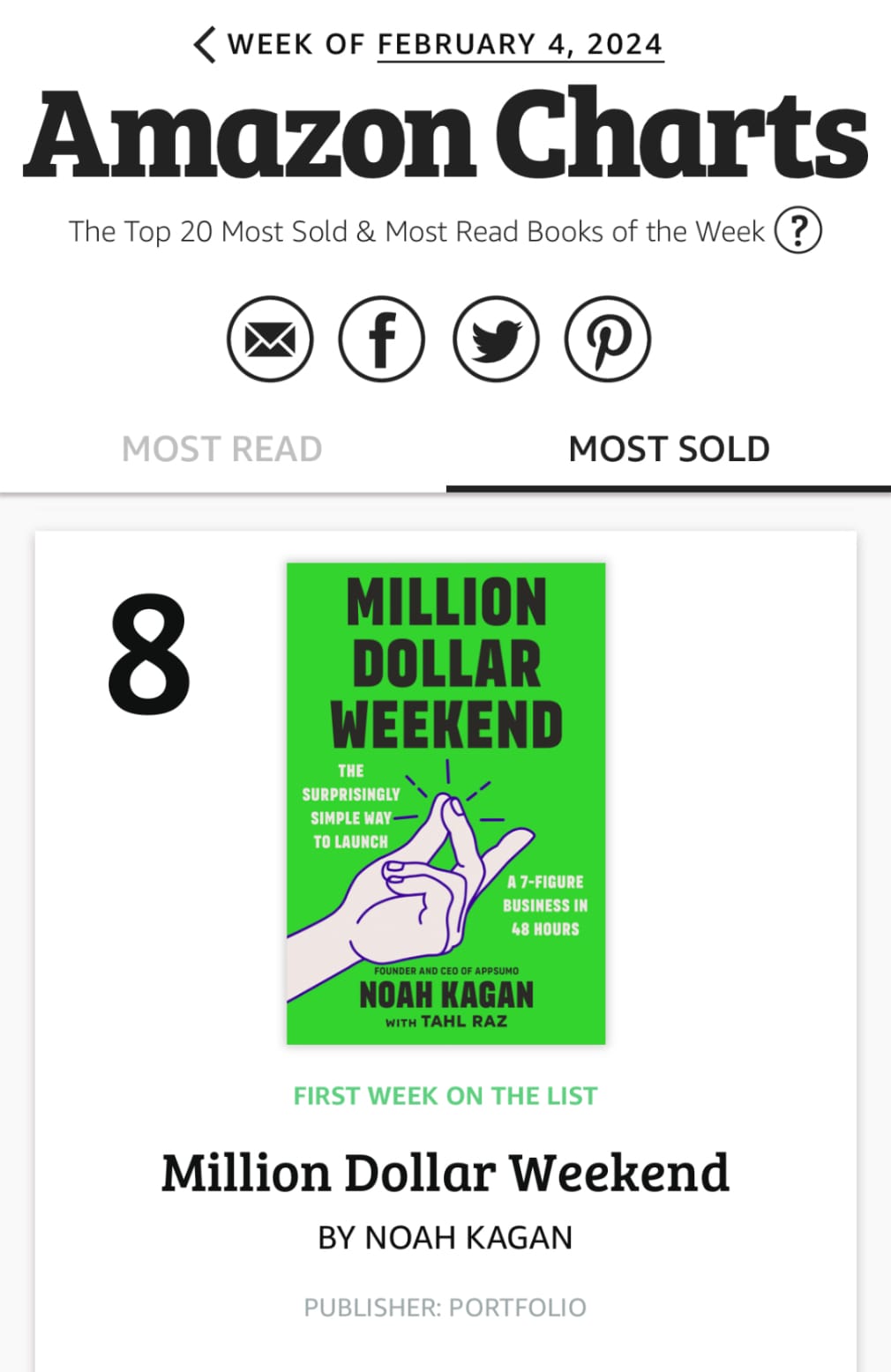
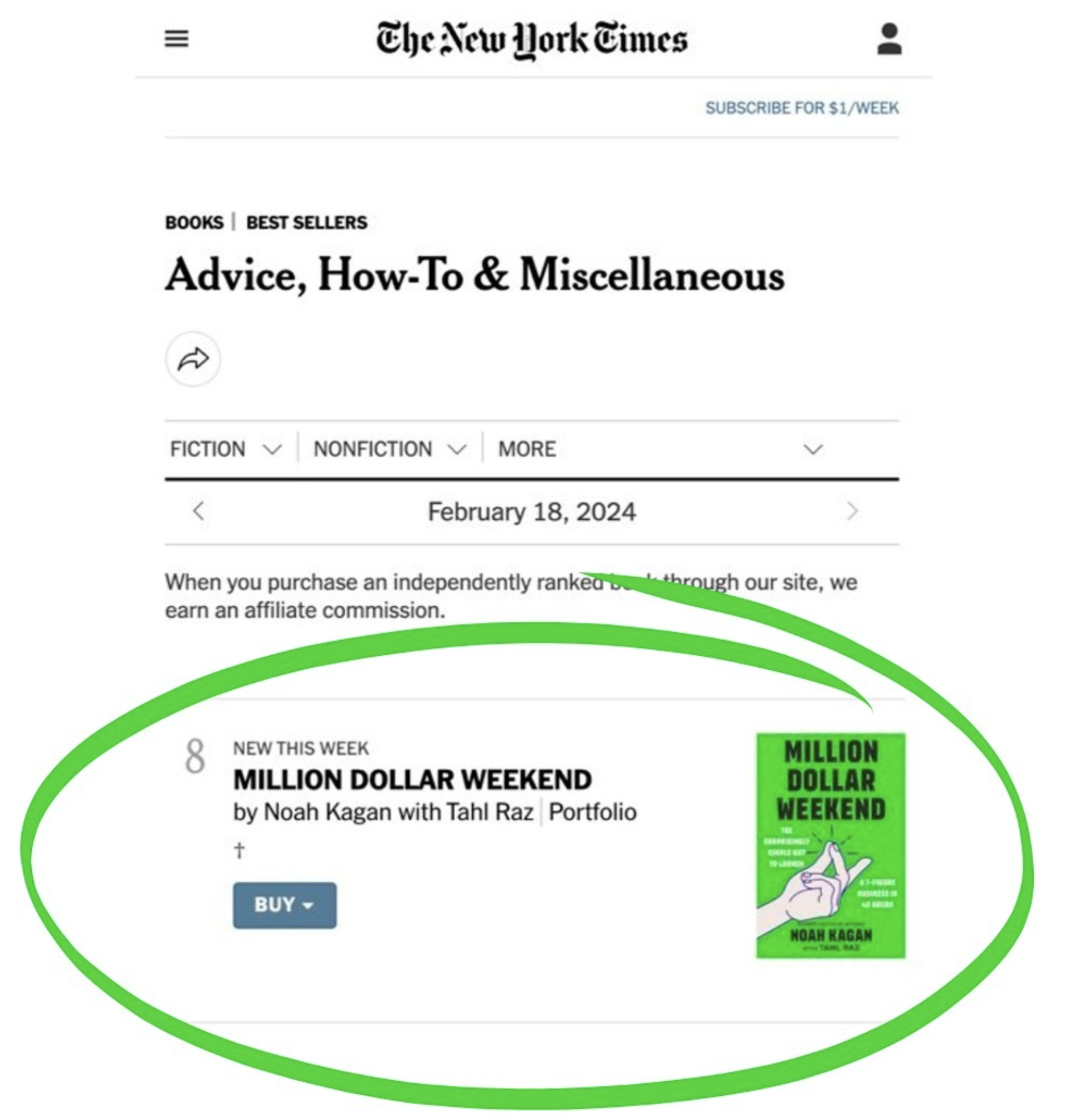
But that still leaves 970,000 copies before it sells a million copies, right? That's a lot. And so he can't just be in launch mode repeatedly. Noah can do this launch maybe two times, which still leaves nearly a million books.
How is that going to happen?
The key here is that he wrote a book that can market itself. This is what I lay out in my article, 'How to Sell a Million Copies of Your Non-Fiction Book'. It has to have the DNA of a book that is:
- Remarkable
- Impulse purchase
- Brag-worthy
- Transforms you,
- Cult-worthy
Is this book guaranteed to sell a million? No, of course not. There are no guarantees. But I think Noah has so much in his favor going with this book. I believe it's inevitable that, over the next decade, it will sell a million copies.
You heard it here first :)
But because every author cares about launching their book and they think it's super important, let's talk a little bit about it.
Most authors get super anxious during their launch. What happens is they try to do a little of everything, and those things don't even work.
Then at the end of launch week, they say:
'Wow... I've only sold 100 copies. This book is a failure.'
No, it's not! That's like judging a human being the week it's born. Don't judge it so harshly!
After a good launch, most authors typically sell about 1,000 copies over the course of the next three months. This is for self-published authors, by the way. So any traditionally published authors who are thinking, 'Oh, that's garbage,' remember this...
Traditionally published authors are playing a different game. That game is maximizing the number of units sold. They have only been able to sign with a publishing house because that house knows that they have 10,000 units sold on day one in working with that author, because their audience will buy it. So don't judge the self-published authors who can only move a thousand books over the course of a few months.
1,000 copies sold over 90 days is solid.
You just introduced your book into the collective consciousness. It is now your job to set up systems – marketing systems – that can continually sell it and make it easy for people to talk about and buy and gift.
I got over 600 reviews on my book Play It Away, mostly because I set up an email automation sequence for a free email course to people with anxiety.
They would get 10 tips – one tip a day – and I would say:
'Did you like this tip? It was taken from my book 'Play It Away'. If this is helpful, it would be great if you left a review.'
I got hundreds of reviews that way. And that book has now sold over 30,000 copies through that system.
This is why I say it's so important to do the book business plan in advance. You can actually achieve your financial goals and lifestyle goals by giving away your book for free.
I have seen authors make millions of dollars and not even sell their book on Amazon. They give it away.
I have seen people do "free plus shipping and handling" funnels, so they give their book away, and then they get people on an email list that sells them other stuff like supplements, coaching, courses. And they make millions of dollars that way
They also get their book out there, thousands and thousands of copies. I know a guy who sold 500,000 copies of his book this way.
So that's where you really want to think: marketing systems that can sell the book for the next 10, 20 years.
You can make all your dreams come true by having a great book. But remember:
The launch does not make or break the book! Your marketing systems are far more important than the launch.
Grab a copy of Million Dollar Weekend. Many congrats to Noah for his well-deserved success!
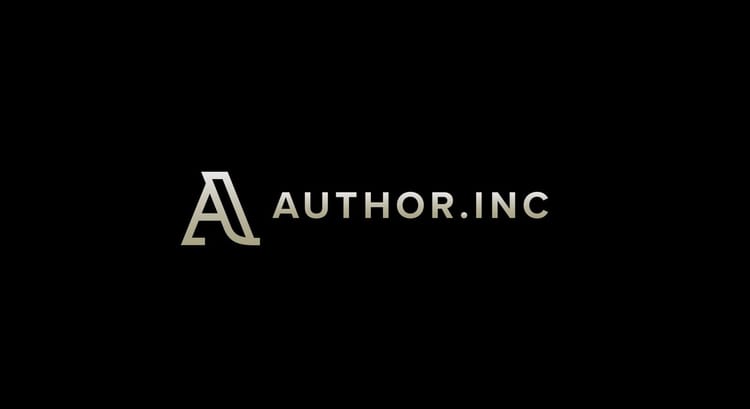
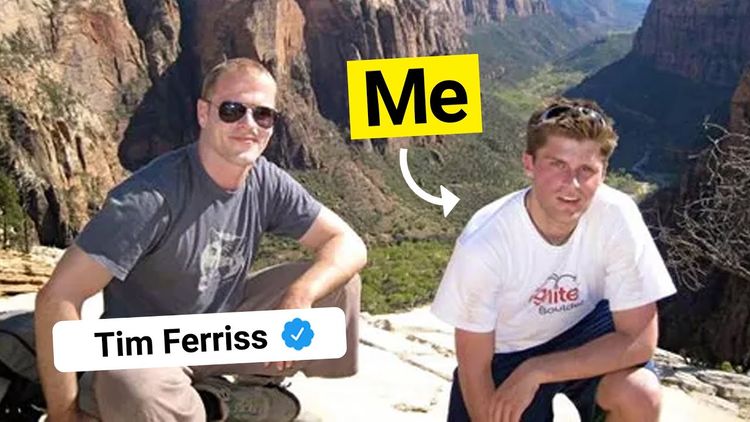
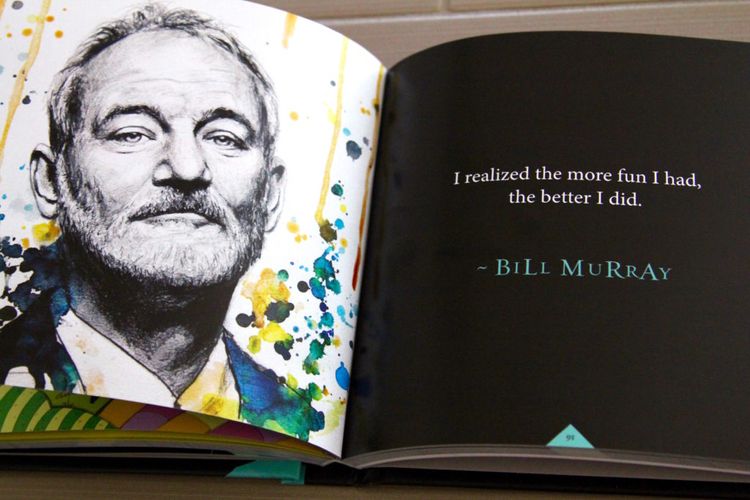
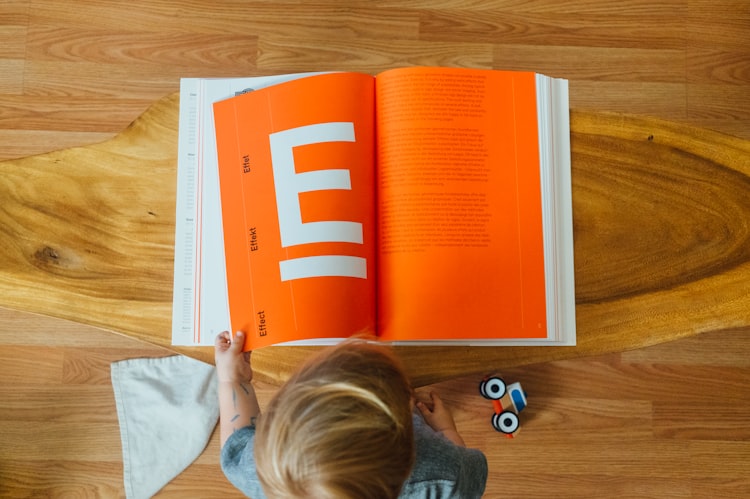

Member discussion